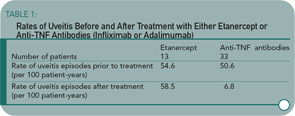
Although few patients were studied, these results are interesting and potentially clinically useful. This study adds to the growing literature on the ability of anti-TNF medications to prevent recurrences of uveitis and supports this literature in suggesting that infliximab may be more effective than etanercept in this regard. There are few data from other studies on whether adalimumab can prevent uveitis. However, this study did not have an untreated control arm, and therefore we do not know how these patients fared compared to patients who were not treated. The accuracy of the methods used in this study to document episodes of uveitis was not reported, and recall by patients of episodes that occurred in the distant past might have been poor, but would be expected to be similar in all patient groups. Concomitant treatment with other disease-modifying medications might have contributed to differences between treatment groups, but similar proportions received these medications, and no patients received sulfasalazine. The mechanisms potentially responsible for the differential effectiveness of etanercept and anti-TNF antibodies have not been explored, although parallels have been drawn to Crohn’s disease treatment.
This study suggests infliximab or adalimumab might be preferred treatments for patients with spondyloarthritis who have indications for anti-TNF treatment for musculoskeletal symptoms and frequent uveitis episodes. Firmer evidence of a differential effect among anti-TNF medications might come from studies of biological registries, although these sources might not include data on pre-treatment uveitis episodes. While this study is timely, it should not distract us from considering conventional disease-modifying medications. Future clinical trials should include a placebo arm as well as sulfasalazine and methotrexate arms.
